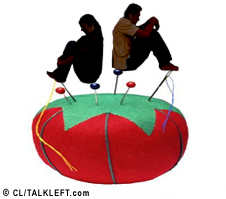Of course, this is reading tea leaves, but it sounds to me like one person (at least one, but in the minority) is taking the position that there is reasonable doubt because Fitz didn't prove that it was impossible for Libby not to have remembered an event.
Why in the minority? Because the answer is obvious and should be to them. It sounds like the majority have tried explaining this point over and over to one or a few people and they keep not getting it.
As to what the event is, I suppose it could be a conversation or a meeting. But I doubt they would have called it "an event" if they were talking about a particular statement within a conversation. Some possibilities:
- The most basic: Could he have forgotten his June discussion with Cheney about Joe Wilson and his wife at the time he spoke with Tim Russert in July...so that as he said, when he heard it from Russert, it was like he was hearing it for the first time.
Less Likely:
- The June 23 meeting with Judith Miller (which they are allowed to consider in deciding the obstruction charge which is now based only on conversations with Cooper and Russert, even though Libby's statements about Miller are no longer a part of the crime.) (Corrected per Marcy to reflect that the June 23 meeting was never part of the obstruction charge--only the July 12 meeting was, although the Court instructed the jury that all Miller conversations are still fair game for consideration of the obstruction charge.)
Update: On to the first note about the third statement in Count 1 of the Obstruction charge on pages 63-64. Here they are. The jury wants to know, since the statement is not in quotes, whether they should consider all of Libby's grand jury testimony or whether the court wants to direct them to parts of it.
(3.) That Mr. Libby advised Matthew Cooper of Time magazine on or about July 12, 2003, that he had heard that other reporters were saying that Mr. Wilson's wife worked for the CIA, and further advised him that Mr. Libby did not know whether this assertion was true.
Update: The jury only has the paper transcript of Libby's 8 hour testimony. They don't have it on computer like we do. If they did, they could go to these pages and read what Libby told the grand jury about his conversation with Cooper.
Your thoughts?
Update: Christy of Firedoglake and Marcy Wheeler (Empty Wheel) weigh in. Tom Maguire has posted the 127 pages of jury instructions here.




